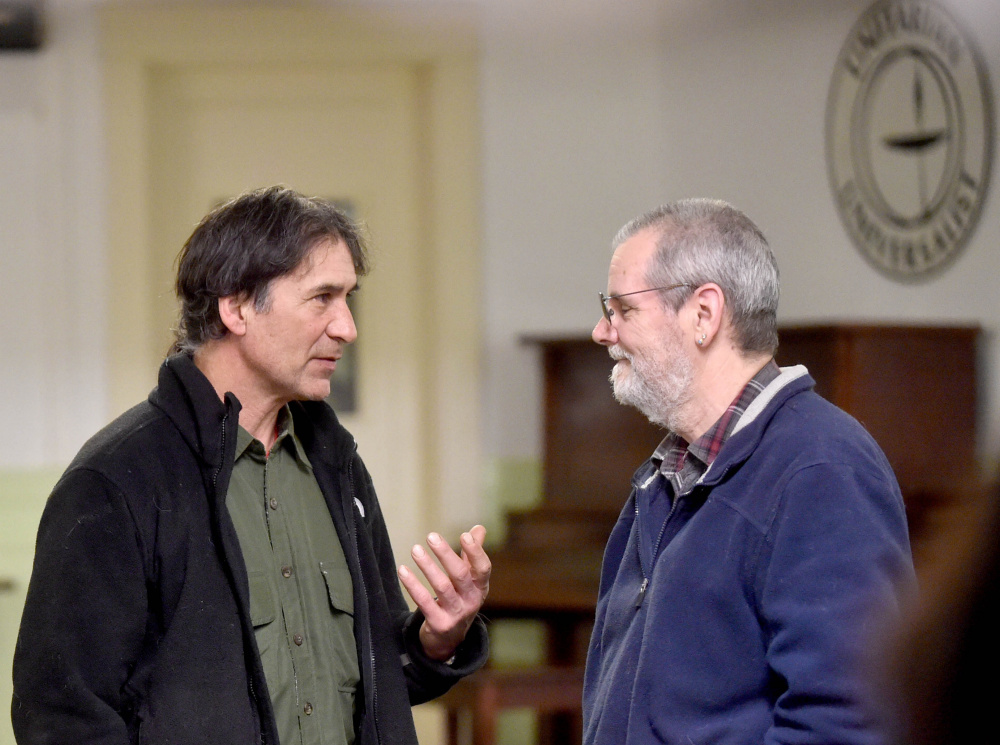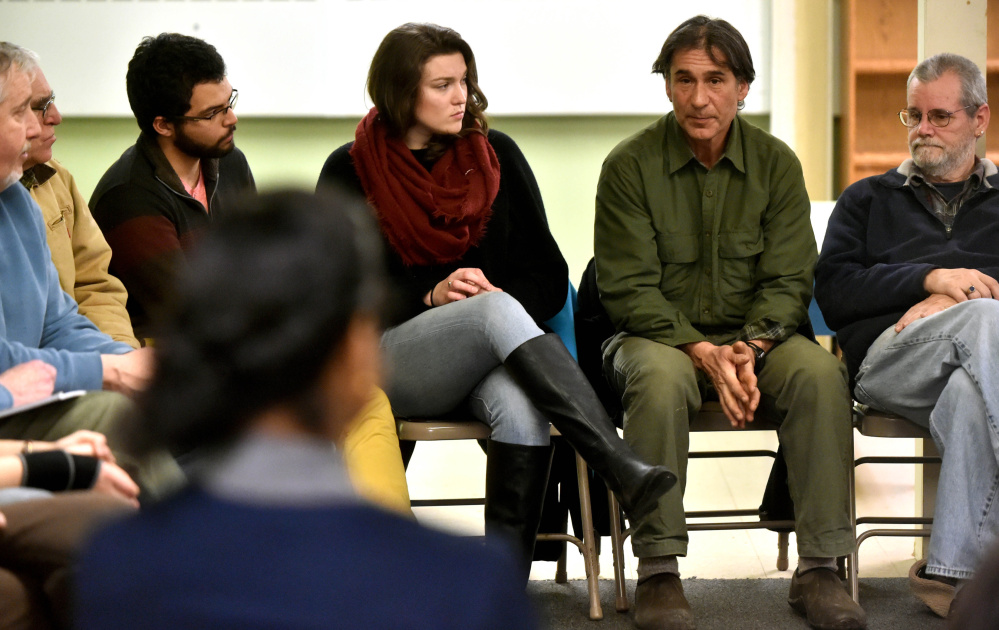WATERVILLE — Barry Dana does not operate on a desire to be an activist or protester when it comes to environmental issues such as the effort to stop the Dakota Access Pipeline.
For Dana, former chief of the Penobscot Nation, the practice of protecting the Earth is part of his culture.
“It’s the inherent, traditional mindset to protect what you’ve been given the responsibility to do,” he said. “It’s to protect your mother, and it’s without compromise.”
Dana, of Solon, spoke Thursday night to about 30 people who turned out at the Universalist Unitarian Church on Silver Street at the invitation of 350 Central Maine, a grass-roots organization that seeks to solve the climate crisis. It is part of 350.org, an international organization.
Dana spoke of the Standing Rock Sioux tribe, which, with allies from hundreds of other tribes and advocates, have been camped out for months in North Dakota to try to block construction of the Dakota Access pipeline, a $3.8 billion project that seeks to connect shale oil fields in North Dakota to oil refineries in southern Illinois. The pipeline threatens both burial sites and water resources, according to the Standing Rock Tribe.
Last month, the Army Corps of Engineers denied a request for a permit to drill under the Missouri River, stopping construction for the time being. The pipeline is intended to be 1,172 miles long and carry more than 500,000 gallons of crude oil daily.
While the construction is halted temporarily, many fear President-elect Donald Trump may overturn the ruling.
Dana described nature as something not separate from oneself.
“The purpose, the whole idea of protecting nature — it’s not nature, it’s your relative,” he said. “It’s not the environment; it’s your mother. It’s not a river; it’s the vein of her lifeblood.”
He said he was raised with the mindset that nature is life and that without it, one dies.
“Your purpose in life is to protect it — not for your life, but for future generations.”
As a teenager, Dana attended unity gatherings with his mother and his grandmother in Canada and New York, he said. He listened carefully to what the elders at those meetings talked about — the responsibility one has to his mother and to learning one’s culture and not getting so caught up in technology that that culture is abandoned.
Dana learned all sorts of things from his elders, including how to make baskets, tan hides, make a fire without use of matches, and hunt and fish, he said.
But when he became older, he noticed people were dying. He struggled intellectually, knowing he had song, dance and language, but his people were dying. He was athletic; he ran marathons and raced canoes at the national level, yet he suffered a heart attack.
“I realized, after nobody told me what happened, why it happened. It came to me it was the food I was eating. I was eating the wrong food.”
He changed to eating native food and now teaches others the importance of doing so.
“How do we regain our health as native people? It’s re-learning so many different aspects of native thinking — native culture, native values, native skills. You start learning about food and where it comes from. It’s all tied into oil.”
When he was 15, he heard about pipelines, which were referred to as black snakes, he said, noting that everyone who was sitting in the circle at the church Thursday night contributed to that snake unless he or she walked to the meeting.
“I’m no angel in terms of oil,” he conceded. “I have a vehicle. So we have to say, ‘Well, what can we do?'”
Dana said he is asked to fly to other places to speak or to take jobs that require he fly a lot; but he will not fly, as oil is being burned in the airplanes. The last time he was out of state was three years ago, when he drove to Vermont to run in a marathon, he said.
“I don’t need to fly and I’m not going to, and I can make arrangements and just not do it,” he said.
He grows his own food — corn, beans, squash and the like — and eats deer, moose and fish.
“Just that one thing alone, if everyone did it, what would happen to food production in the world?” he asked. “It’d go, overnight, to local farms.” W. Elery Keene, of Winslow, said he appreciated Dana’s words and cares a lot about Native Americans.
“I sometimes think about what Israel is doing with Palestine. They’re doing similar things to what white people are doing to Native Americans, and I think they’re both wrong,” Keene said.
He said it is imperative people that respect others, regardless of differences.
“We all have to be honest and plan for lives that will be good for everyone,” he said.
Iver Lofving, a teacher and environmentalist who lives in Skowhegan, said it takes something like Standing Rock to prompt people to make a stand. It must be done because otherwise such activity can kill people, he said.
“It would not take much to basically kill the world that feeds us,” Lofving said.
David Solmitz, of Waterville, said his daughter, May Ye, a classical piano major and senior at Western Michigan University, spent time at Standing Rock on her Thanksgiving vacation. A socially conscious young woman, Ye was moved by “the incredible understanding and compassion of the Native Americans, and yet they were taunted and humiliated by the police at all times,” Solmitz said.
Three years ago, Ye went to Israel and could not understand why the Jewish people — particularly the government — treated the Palestinians so terribly, Solmitz said.
“She felt a commitment to become Jewish, to become a rabbi, and make sure the Palestinian people would be given complete justice, and I’m very pleased she has taken that initiative to work to become a rabbi to work toward peace and justice between the Palestinians and Israelis.”
Amy Calder — 861-9247
Twitter: @AmyCalder17
Send questions/comments to the editors.





Comments are no longer available on this story